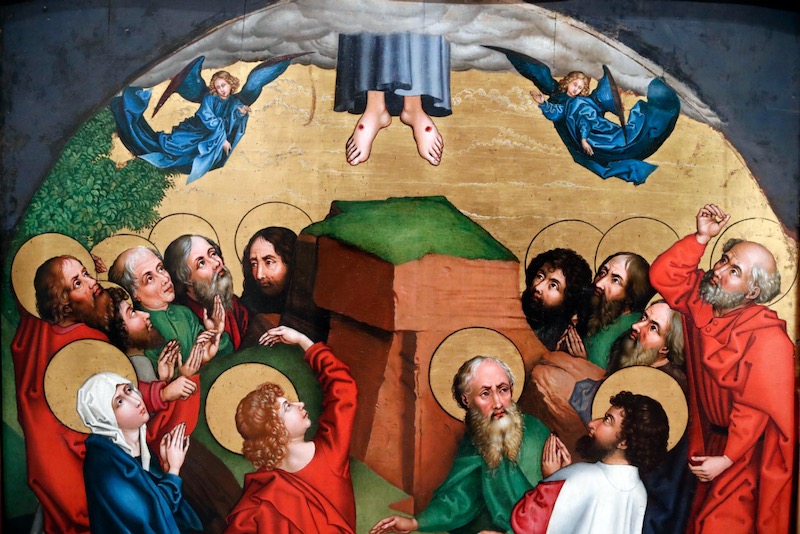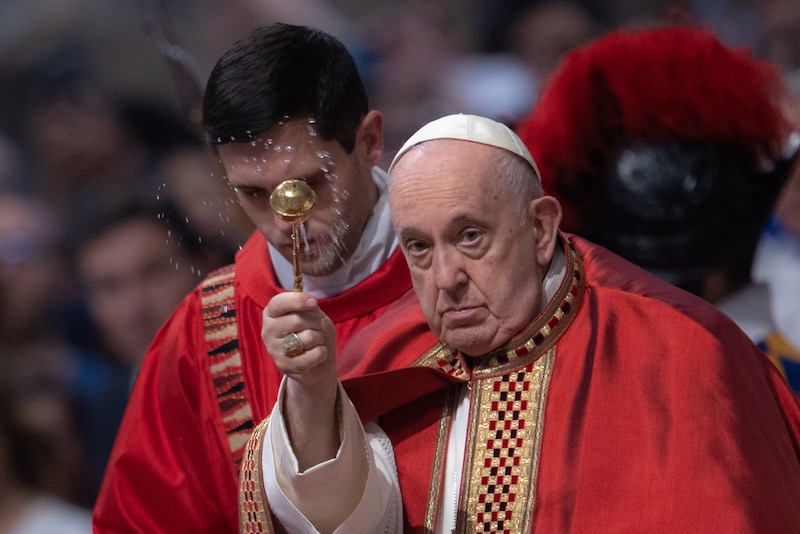God is infinitely more than anything we can think, say, or know, for two seemingly paradoxical reasons: namely, that God, as the creator of everything from nothing, is both too far from us and too near to us. He is so distant from us as to be beyond our reach linguistically, imaginatively, and visually; but, at the same time, he is so inwardly intimate to everything that exists and so deeply present in all our thoughts and every movement of our wills, minds, and bodies, that we cannot form a distinct concept of him. God, in other words, both utterly transcends and is all–pervasively immanent in all that he has made. It follows that, though we can arrive at the rational conclusion that there is an ultimate source of existence, that the word “God” has a reference, that something must account for the fact that there is anything rather than nothing at all – we can become convinced that God exists, in other words – we cannot apprehend God by dint of intellectual or any other kind of knowledge. We “see” and “hear” and “know” God only in Christ, the incarnate Son of God, in whom God unites himself to our nature. “Whoever has seen me, has seen the Father” (John 14:9), Jesus tells Philip.
But while the capacity to see and hear the man Jesus is a function of our human nature, the capacity to see and hear the Son of God is a function of grace. We see and hear Jesus through the gift of sight and hearing; we see and hear the Son of God through the gift of faith. The former is made possible by birth, by which we share in human nature; the latter is made possible by grace, by which we share in God’s nature. And that sharing in God’s nature, that sharing in his life, is what we mean by the gift of the Holy Spirit. We see and hear God in Christ, his Word, only by the power of the Holy Spirit, whom Jesus promised to send to us after he had ascended to his and our Father. The Holy Spirit, the third person of the Blessed Trinity, has been compared to the sun: impossible to gaze upon with the naked eye, but the light by which we see anything at; or to the air, without which we could not breathe and without which no bird (or aeroplane) could fly.
What these pale comparisons convey is that, when we say in the Creed that we believe in the Holy Spirit, we are articulating not just one of the things we believe about God, but rather, that by which we believe everything that we believe about God. In the course of his treatment of the divine persons of the Trinity in the Summa Theologiae, Aquinas speaks of the Holy Spirit are both Love and Gift. He quotes a sermon of St Gregory the Great on the feast of Pentecost: “Love is the Holy Spirit Himself”. And he quotes St Augustine, saying that the Holy Spirit is God’s gift of himself; or, as Nicholas Lash once said, the Holy Spirit is God’s “givenness”. Gift and love are, of course, inextricably interconnected. Love is the greatest gift we can give and receive; it is pure gift. The Holy Spirit is the bond of love that unites the Father to the Son and the Son to the Father. By the gift of the Holy Spirit, we participate in the love that is the Trinity, that is, God. The gift of the Holy Spirit binds us to God and one another in love. There are many gifts in this life, but the greatest of them is love. It is unassailably true that it is the gift of genuine love that makes the greatest difference to our lives: we are made the people we are by the love that we give and receive.
Every expression of genuine gratitude is ultimately an expression of gratitude for love. And, whether realised or not, all gratitude is ultimately gratitude to God, named or unnamed, known or unknown. But God is not just the giver of every gift, but Givenness Itself: and he gives us himself, his life and his love, by the gift of the Holy Spirit. The manifest difference made by the gift of the Holy Spirit to the cowering disciples is vividly described in today’s readings. At first, their situation is one of fearful stasis, trapped and powerless in a state of paralysed disillusionment with the past, incapable of moving forward. It is a situation is all-too familiar to most of us. Feeling powerless to bring about the changes we yearn for, we put our lives on hold, waiting for that “something more” that will make the crucial difference and, as a consequence, we miss myriad movements and promptings of grace and gifts given here and now.
That “something more” never comes, of course, because we are looking in the wrong direction. Pentecost powerfully reminds us that the really important changes in our lives come, not from outside of ourselves, but from within, from the Holy Spirit, “the Lord, the Giver of Life”, who is permanently present to and with us. One very public aspect of the disciples” transformation is described with a wonderful touch of earthy realism that only 4 serves to lend credibility to the account. (It comes a few verses later in Acts, unaccountably omitted from today’s first reading.) The behaviour of the disciples under the influence of the Holy Spirit was cynically dismissed by some of their hearers as the effects of too much wine (2:13) or, more precisely, according to the text, too much new wine which, as we well know, goes to the head much more quickly. Again, in another disarmingly earthy detail, Peter counters the charge that it’s the drink talking, by saying: “These men are not drunk, as you suppose, for it is only nine o”clock in the morning.” (2:15) The transforming effects of the Spirit and the transforming effects of wine – the benign ones, at least – have much in common. The experience of the Holy Spirit is compared to wind and fire, the two most powerful and volatile forces of nature. Those images remind us that to invoke the Holy Spirit isn’t to ask for a gentle nudge from time to time, but to have a wild, untameable energy sweep through our lives. The resulting transformation will be, as it was for the first disciples, dramatic, to say the very least. God, however, is infinitely courteous: he invites our consent. To use a modern metaphor: the programme is already downloaded and installed, it needs only to be activated; and for that, our consent is needed. When we pray to the Holy Spirit, then, we are praying for change in the depths of our being; we are praying to come alive in the Spirit. “Come, O Holy Spirit, fill the hearts of your faithful, and enkindle within us the fire of your love.” That change changes nothing less than everything.
St Paul enumerates the “the fruits of the Spirit”: love, joy, peace, forbearance, kindness, goodness, faithfulness, gentleness and self–control. But what are the inward signs of new life in the Spirit? The gospels and the rest of the New Testament give us lots of clues. They talk about a wholly different kind of relationship with God, in which, says John, his commandments are not burdensome. Jesus himself says, “My yoke is easy, and my burden is light”. Living the Christian life, in other words, isn’t meant to be dominated by dutiful slog, self–regardingly striving to win spiritual brownie–points by desperately and fearfully trying to keep on the straight and narrow. To live the Christian life is, first and foremost, to rejoice in a gift given to us. And that’s what the Holy Spirit enables us to embrace. Through the gift of the Spirit, God has shared his own life and love with us; he has freely chosen to be the God of forgiveness and acceptance and has invited us to live in friendship, with him and one another. And this is real freedom, the freedom of the Spirit who blows where he will. The Spirit frees us from both presumption and despair: from the crippling presumption that we can make ourselves presentable to God and win his love and acceptance. We don’t need to win his love: it is ours as a free gift. And he frees us from despair, from that crushing sense of unworthiness in the face of our sins. Nothing but nothing can separate us from the love of God, and certainly not our weaknesses and failures. No matter what we do, we can’t persuade or induce God to stop loving us. What the disciples experienced at Pentecost was the miracle of change that only genuine love effects; their hearts, to paraphrase Seamus Heaney’s words, were blown wide open. And genuine love is always the work of the Spirit and the only reliable proof of his presence. We have all received the gift of the Holy Spirit: but we have still to grow into the fullness of the Spirit. It’s for that reason that this feast of Pentecost is as much a challenge as a celebration.



 Loading ...
Loading ...
What do you think?
You can post as a subscriber user ...
User comments (0)